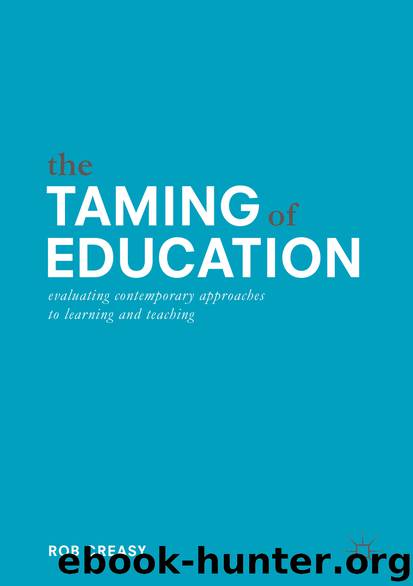The Taming of Education by Rob Creasy

Author:Rob Creasy
Language: eng
Format: epub
Publisher: Springer International Publishing, Cham
6.3 Assessment as Taming a Wicked Problem
The argument that is being put forward within this book is that education in England is being impoverished because it is being tamed. A major factor within this taming of education is the fact that education is increasingly being seen as a process. However, as the process of education is intangible, there is pressure to construct a proxy output; this is achieved through assessment and certification . However, in setting out to assess students’ learning , we are faced with a wicked problem. The challenge of revealing what any student has learnt is significant given the extent and complexity of learning especially as we progress upwards through the levels of education.
As has already been noted, the complexity of education poses a challenge when it comes to establishing valid means of assessment. This can be particularly true for the type of soft skills that employers value in graduates, such as critical and original thinking (Knight and Page 2007). So, with respect to the suggestion that the practice of assessment may be seen as a mechanism which serves to tame the wicked problem of assessing the nature of the learning that has taken place, what this leads to is a situation whereby we focus our assessment on those things that are valued but where we then come to value that which we assess (Edwards 2000). In other words, it may not be the extent of learning and development that is being assessed at all, only that which is feasible, or seen as possible, to assess.
In taming the wicked problem of being able to make a judgement about the outcome of learning , we face the risk that we simplify the process by which we do this and, in doing so, downplay the extent and complexity of learning . There can be some value, then, in being aware of the potential of wickedity within assessment. By this I mean assessment that can accommodate and reward creativity and originality. This is because it can serve to remind us that there are benefits to be gained from an assessment strategy and/or practices which are able to preserve the challenge of education and which reflects the richness of the learning experience. As such, there are benefits to be gained from assessment that is wicked rather than tame. The need to recognise wickedity in assessing learning requires a consideration of how it may be possible to capture and represent the richness and complexity of education and learning . In this way, to approach education from the perspective of wicked problems can be seen as legitimate given the interplay between education, its goals and its practices.
The aim of assessment is to reveal the nature of the learning that has taken place. Put like this, the idea of assessment is a simple one. It is tame. Implicitly though it reflects a process which seeks to reveal what another individual both knows and understands, to generate empirical evidence about the individual. There is an
Download
This site does not store any files on its server. We only index and link to content provided by other sites. Please contact the content providers to delete copyright contents if any and email us, we'll remove relevant links or contents immediately.
Spare by Prince Harry The Duke of Sussex(5197)
Navigation and Map Reading by K Andrew(5159)
Tuesdays with Morrie by Mitch Albom(4785)
Machine Learning at Scale with H2O by Gregory Keys | David Whiting(4313)
Cracking the GRE Premium Edition with 6 Practice Tests, 2015 (Graduate School Test Preparation) by Princeton Review(4294)
Never by Ken Follett(3958)
Goodbye Paradise(3811)
What It Really Takes to Get Into Ivy League and Other Highly Selective Colleges by Hughes Chuck(3760)
Fairy Tale by Stephen King(3400)
Harry Potter and the Prisoner of Azkaban (Book 3) by J. K. Rowling(3360)
Pledged by Alexandra Robbins(3179)
Kick Ass in College: Highest Rated "How to Study in College" Book | 77 Ninja Study Skills Tips and Career Strategies | Motivational for College Students: A Guerrilla Guide to College Success by Fox Gunnar(3131)
Reminders of Him: A Novel by Colleen Hoover(3121)
A Dictionary of Sociology by Unknown(3085)
Sapiens and Homo Deus by Yuval Noah Harari(3076)
The Social Psychology of Inequality by Unknown(3031)
Graduate Admissions Essays, Fourth Edition: Write Your Way into the Graduate School of Your Choice (Graduate Admissions Essays: Write Your Way Into the) by Asher Donald(2923)
Will by Will Smith(2922)
Zero to Make by David Lang(2786)
